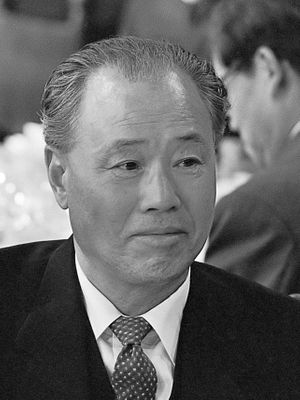On February 26, 1989, U.S. President George H.W. Bush, during his only trip to China as president, met China’s paramount leader Deng Xiaoping and Communist Party General-Secretary Zhao Ziyang. These leaders didn’t know they would be meeting in the twilight days of the Cold War—or even that later that year, in early June, unprecedented protests in Beijing’s Tiananmen Square would force the United States to place an arms embargo on China.
Earlier this week, the Digital Archive at the Wilson Center posted a declassified transcript of Bush’s conversation with Zhao. (The transcript of talks between Bush and Deng has been available for some time.) Where Bush and Deng discussed the trajectory of post-Second World War history and China’s strategic considerations, Bush and Zhao have a fascinating conversation about then-contemporary challenges across Asia.
I spent some time reading the Zhao transcript and there’s quite a bit to be gleaned therein on how China saw challenges around the Asia-Pacific at the time, including issues on the Korean Peninsula, the relationship between India and Pakistan, and the role of the Soviet Union across the continent.
On nonproliferation in South Asia, Zhao goes to bat for Pakistan, a mutual ally for both China and the United States at the time. His remarks demonstrate that China read India’s 1974 Smiling Buddha ‘Peaceful Nuclear Explosion’ as a coming-out for an Indian nuclear capability, even though New Delhi would only formally do so in 1998.
“There are two big countries in South Asia. One has a nuclear device and no one says anything about it,” he tells Bush. Batting for then-Prime Minister Benazir Bhutto in Pakistan, Zhao tells bush that “Pakistan is not seeking nuclear weapons. They are engaged in peaceful uses of nuclear energy.”
Of course, Pakistani testing had been going on throughout the late-1970s and 1980s, to the full knowledge of both Bush and Zhao. Bush, politely, told Zhao that the United States “had pretty good evidence to the contrary” of what Zhao was claiming.
Bush and Zhao also exchanged advice on how best to approach North Korea, which was at the time under Kim Il-sung’s leadership. A lot of the advice doled out then could apply in the current context, emphasizing perhaps how little the broader diplomatic approach to Pyongyang has changed. Bush laments Kim Il-sung “and his son,” Kim Jong-il.
“We need to identify people who have influence who are more reasonable than the two top people in North Korea,” he tells Zhao. Zhao responds that “In my view, if you want to improve relations with North Korea, you must deal with the two people you don’t like.”
Later in their conversation, Zhao asks Bush for advice for his upcoming trip to Pyongyang. Bush encouraged Zhao to in turn encourage Kim Il-sung to pursue a direct reduction of tensions with South Korea, which didn’t appear to be forthcoming at the time. Bush, echoing sentiments that have been expressed by some candidates in the 2016 U.S. election cycle, cited Washington’s interest in seeing tensions go down: “We would genuinely welcome reductions of tensions on the Korean Peninsula. It would be wonderful for us. It’s very expensive.”
Incidentally, Zhao would find himself in Pyongyang a couple months later, when the student protesters that were eventually gunned down on Deng’s orders in June were starting to gather. In fact, as a Guardian obituary for Zhao noted in 2005, had he been in Beijing instead of Pyongyang in April 1989, the events that led to the intensification of student protests—and the subsequent crackdown—may have been avoided altogether.
Of course, the longer term policy implications of what Zhao and Bush discussed never really ended up panning out as planned given the geopolitical fallout of the dissolution of the Soviet Union (thus, the end of the Cold War) and the global reaction to Deng’s crackdown at Tiananman in June of that year, which ended up transforming China’s foreign policy in its own way.
These events in tandem meant that the short-term cooperation that these leaders may have envisaged during Bush’s visit to China that February didn’t quite end up panning out. It didn’t help either that Zhao ended up purged from the CPC’s leadership following the events at Tiananmen and his disagreements with Deng.
The full transcript is well worth a read for insight into the moments right before the most important turning point for the U.S.-China relationship in the final days of the Cold War.

































